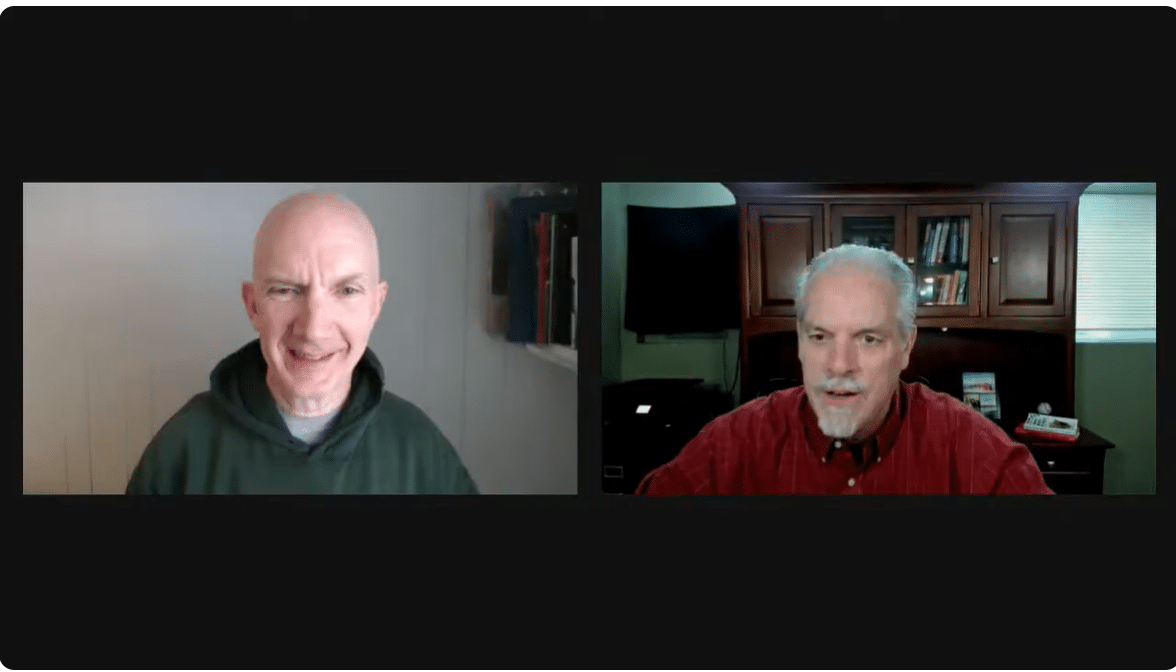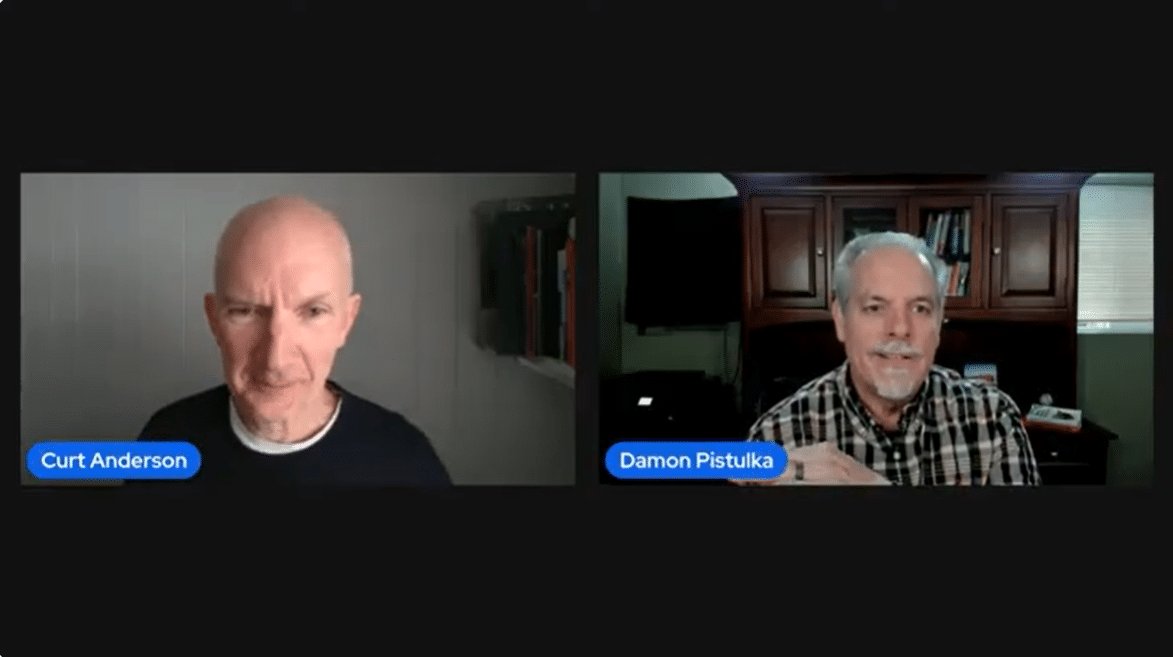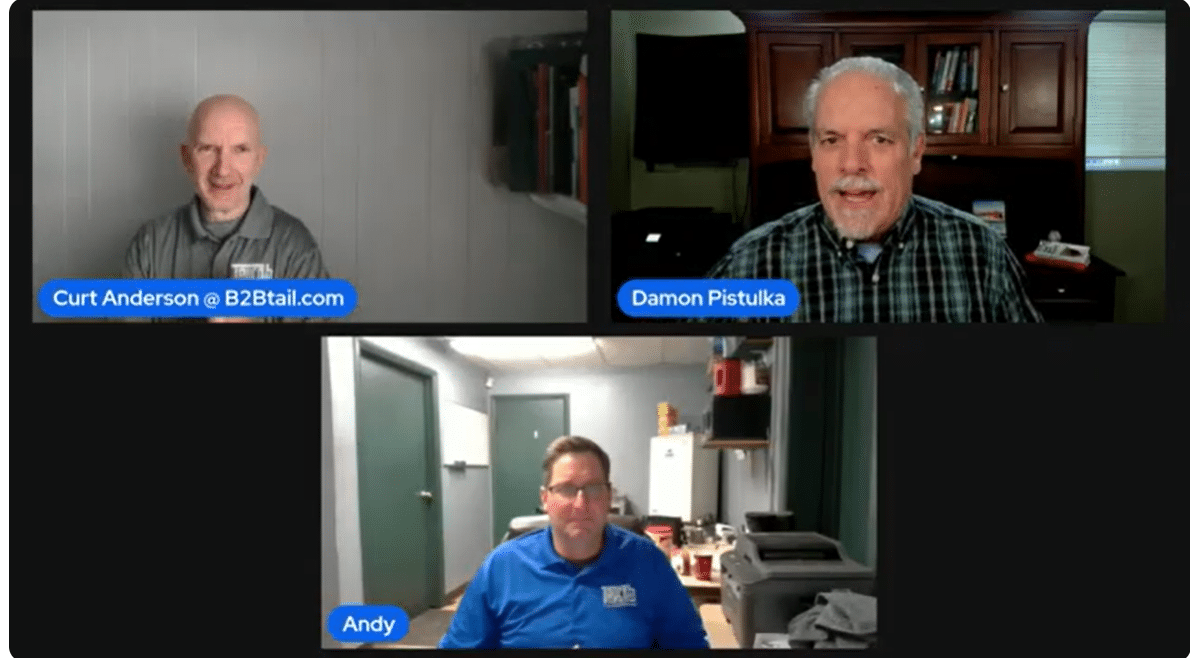• 15:06
SUMMARY KEYWORDS
Digital marketing strategies, digital game plan, industrial companies, B2B manufacturers, buyer personas, SWOT analysis, core strengths, buyer journey, soulmate success path, content creation, marketing tactics, customer engagement, competitive analysis, niching market.
SPEAKERS
Damon Pistulka, Speaker 2, Speaker 1, Curt Anderson
Damon Pistulka 00:03
All right, everyone, it is Friday, and you know what that means. It is time to stop being the best kept secret. I’m your co host, Damon Pistulka, and that pretty gentleman right over there is Kurt Anderson puppy dad extraordinaire. We were a minute late because someone’s puppy decided that his phone should his dad’s phone should be in the bed with him.
Speaker 1 00:28
That’s right. Yeah, yeah, thanks, yeah. But today
Damon Pistulka 00:32
we’re going to be talking about digital marketing strategies for manufacturers and the importance of creating a digital game plan. So Kurt, first of all, why do you think Louie wanted your phone?
Curt Anderson 00:47
Does anybody have a puppy out there? Man, I’ll tell you. It’s like, it keeps if it keeps you on your toes. Man, having a puppy is, like, the best thing on the planet. So I’ve got a little English bulldog puppy in his name’s Louie, and he is absolutely hysterical. And so I’m like, Man, where’d my phone go? I’m looking all over the place. And, yeah, he had it snowed up, and he’s got this, like, this little bit.
Speaker 2 01:08
That’s awesome. Yeah, that’s awesome. Alright, so Damon,
Curt Anderson 01:12
let’s dive in, dude. So we want to talk about digital marketing strategies for manufacturers. Most importantly, building out a digital game plan, you know. And I tell you, this is so important, because a lot of times, you know, we had a dear friend on the show one time, and she talked about how Michelle and you get caught in that the tactics sprint right? And you’re just like, hey, let’s try this. Let’s try this. And you’re just kind of throwing meatballs on the wall to see what sticks right. So what the intention here? How can we get more thoughtful. How can we get more intentional? How can we get a strategic digital game plan? So like, hey, you know, entrepreneurship is, is gambling, right? Let’s, let’s call it what it is. Let’s get so like, how can we put the odds in our favor, right? What are your thoughts?
Damon Pistulka 01:56
Yeah, I think it. You know, for a lot of industrial companies, B to B manufacturers, other kind of industrial companies. Marketing is, is a crapshoot, honestly, because they don’t take the time to really understand. Well, first of all, I should. I’m not saying anything about the companies themselves. I mean, you got to put yourselves in their position, right? They don’t. They’ve not had to do a ton of marketing. First of all, or any, what’s that? Or any, or any, yeah, or any marketing. That’s a great point. And then now they know they need to do marketing. So what happens? They’re going to get inundated by many different people. It could be a website person, could be a Google Ads person, a firm. It could be a full service marketing firm, and and we’re like, Oh, if the if the right salesperson hits them today and they say, Well, you need a website, because that’s what you need to do. It’s like, okay, that might be the right case. But I really think that the importance of a digital game plan will tell you what you need at the right point, because if you go out and not know who you’re building a website for who to attract. That’s a problem. If you go out and try to do ads, if you don’t know who you’re really targeting in on you don’t know. And this is why the digital game plan, starting at the beginning and taking the time to really understand that, I think, is so important.
Curt Anderson 03:17
Yeah, I ditto, my friend. Ditto. That’s all I have to say. How about that? So let’s dive into digital game plan. What I did, you know, I don’t know about you. I am an Ink Magazine junkie. We’ve had the honor and privilege. We’ve had the editor in chief on the show twice, yep. And so we’d love Ink Magazine. So I thought like, Hey, since we’re targeting entrepreneurs, small businesses, manufacturers, most many people, many entrepreneurs, are familiar with Ink Magazine. So I thought this would be a great place, great example to cover. So let’s dive in Damon, first and foremost. So this is a little software tool that Damon and I have created on our own. Course, we had to hire somebody to help us. Damon, yes. So anyway, okay, so what we want to do, we want to focus on Damon. Have you ever heard of a SWOT analysis? Have you heard of a SWAT? Yes, I have right many, many times. Well, guess what, my friend, when you hang out with us, you have no weaknesses, you have no threats. We’re just focusing on the strengths and the opportunities. Now, what’s cool is this tool is going out and it’s diving into let’s take a look at this orange column here. First Damon Inc Magazine, you know, authority through high profile expert contributions, consistent coverage of emerging technologies, rich storytelling, featuring real world case studies. So what this tool has done, it’s gone through and it’s pulling out all sorts of information from Ink Magazine to say, like, Hey, this is what you’re absolutely best at, even. Why is it so important to focus on our core strengths?
Damon Pistulka 04:49
Well, because that’s that what is, what primarily makes the biggest difference to your customers.
Curt Anderson 04:56
This speaks, you know, right here, recognition for entrepreneurial education. Hyper relevant coverage of generational workplace changes. So again, the more you focus. I Great example. Okay, you and I have a client that we were working with this week, and this, obviously young man, everybody’s young to me now, you know, but this young man, great entrepreneur, and we, just as we had not had an epiphany, as we were diving into his ideal customers, 800 to 1000 employees. That’s his sweet spot. Huge, huge, you know? And we’re like, he said, Well, you know, we could work with a 50 convert, like, man, it’s like, dude, I’m like, you know, it’s fortune 500 it’s 800 employees and more that type of like, that’s really his sweet spot. That’s his core strength. It really plays well to what he does best at. So again, like what this tool does when it gets you hyper focused on what you’re best at, it’s now, let’s run down. Let’s, let’s take a look at some of the other tabs here. Damon, let’s run down to the soul mate. So for example, like this particular client that we’re talking about, he is decided he’s going all in on major companies, major manufacturers. Okay, now here for Ink Magazine, what this has done. It’s pulled four different buyer personas for us. Let’s just take a look at one of these buyer personas. Okay, so Damon, why is it so important to understand intimately that particular buyer
Damon Pistulka 06:21
well, because each of your personas is going to have different needs throughout the buying process, and they have different questions, they’re going to have different education, they are different things that they want to look at. They’re going to have different motivations, right? And that’s a big one, and pain points, because if you don’t address the pain points and help them with the education, you know, you don’t understand that, if you own and if you understand your motivation, that their motivation, it can help you, you know, get more relevant information to them to make an informed decision.
Curt Anderson 06:54
Yeah, since it’s Hey, is there, is there a baseball game today, by any chance?
Damon Pistulka 06:59
Yes, there is.
Curt Anderson 07:02
So since we’re there’s a baseball game. It’s based there’s, it’s playoff season, whatever time you’re catching this. But in the United States, it’s Major League Baseball playoff time. And so what we have here, you see on the screen, we’ve got singles, doubles, triples and home runs. Now, single is one of those, you know, great customer. You know, take them all day long. They’re not necessarily moving the needle, but man, we love our singles, right? So this one here is Amanda, and what we’re doing is we’re diving in understanding Amanda’s frustrations, her motivations and communication, like, Where can we find and connect with Amanda? This is recommending Instagram, LinkedIn, which we’re live on right now, or newsletters now. Let’s say we want to move up the food chain Damon and we want to go after those home runs, right? Maybe we need to swing the bat a little bit harder. But what do you what? What stands out to you here looking at Eloise, the home run, buyer persona, soulmate. What are your thoughts here?
Damon Pistulka 07:59
Well, there’s a complete different set of frustrations, and, you know, the goals and motivations for them. It really is a different sales process. It’s a different kind of information requirement they need you’re going to have to go through as you move up into home runs. The other thing that might come into it is you have more stakeholders in the buying process, which is a huge thing, right? Absolutely.
Curt Anderson 08:24
So again, so the more you understand your buyer intimately, the better that you can speak to them, understand their problems, their challenges, and come into them and say, Hey, I understand where you’re coming from. I have your back. Here’s the solution. Let’s talk about it. Damon, we won’t we’re going to start winding down here in a minute. Let’s talk about, you know, we hear about that buyer’s journey. On Monday, we did a live stream where we had a survey. We had an expert from manufacturing.net our dear friend, David Manti, and we’re talking about the buyer journey. We’d like to call it the soulmate Success Path. We want to be dedicated to our customers. Success, our soulmate success what stands out to you? What are your thoughts when we talk about that buyer person, or the buyer journey, or that soulmate success path in this particular case?
Damon Pistulka 09:10
Well, I just love the way it’s broken down into these five stages, the awareness, exploration, evaluation, decision and post purchase, right? That mean, until we started getting more and more detailed into this, I didn’t even really think of the buyer journey that way, as much as I do now. And I it’s amazing when you look at what triggers them in each each of those situations, what? How are they going to try to find information for it? What information do they really need and and you know what? What? What’s going through their mind at that point, like we talked about the emotional state, and when you see that on each each phase of the buying process, you really understand how, if I want to, if I want to go after a certain customer, a certain ICP, whatever you. Want to call it. I really need to understand all those buying processes, and I really need to understand all the things that I need to provide at those different stages of that buying process for that soulmate customer. And I need to build those. I need to have that ready, because I’m going to find people that are coming to me just trying to figure out, who the heck. What the heck? At the beginning, I’m going to have people that are going to hit our that are just exploring different options. I’m going to have people that want to hit that site because they’ve gone through those phases and they want to make a decision, you know, or they’re trying to evaluate us against other places for potential things you really it’s so cool when you break it down like that, because it just shows you what you need to do.
Curt Anderson 10:43
Yeah, I absolutely love this, you know. So like when you think about the awareness stage, like your buyer persona, your ideal customer, that soulmate, they it just triggers. We have a problem. We need to seek outside help expertise. Where do we turn? And you take a look here. Here’s some examples, you know, right here, seeing declining engagement rates compared to industry peers, notices competitors are gaining traction on Instagram. Doesn’t that drive you crazy, Damon, and so again, you mentioned like, what’s the search behavior? What’s the emotional state? And then what should it gives? What I love about this tool, it gives a bunch of recommendations. Now, Damon, let’s close out on this. We’re talking baseball today. So we’re talking home runs, the buying process that so many success path for your single compared to your home run, a little bit different here, right? Yeah, the previous one we’re looking at that single was worried about, like, hey, my competitor’s beating me on Instagram. Here we’re to, you know, like, you know, McKinsey or BCG highlights, lag in competitive innovation, you know, recognizes industry wide need for cultural transformation. And down here, it brings together sweet C suite and invite only summits, you know. So it’s a really, a totally different approach, different language that you’re speaking to different buyer personas. And then lastly, in this Ink Magazine should provide. Here’s a bunch of recommendations, white glove, boardroom style, research briefings, quarterly vision, visionary panels, so on and so forth. So what’s great about this tool? It helps you get unstuck. It gets the party started. There’s all sorts of other tabs that we can dive we’re going to be diving into over the next few weeks to lead you up to getting like your keywords, what questions are your buyer, your somebody’s asking? And then how can we create content to get out there and meet them where they’re at? Damon? Closing thoughts, parting shots, what are your what’s going through your mind?
Damon Pistulka 12:33
It’s very important to do this because you know whether you’re targeting, you know, singles, doubles, triples or home runs for your business. It like you said, it’s going to be very, very different if you try to do it all. And as we always say, if you try to be everything to everyone, you’re nothing to no one, right? So when you really can focus in on that, and you may, you may go, Okay, we’re doing doubles today, and six months from now, we might want to do triples, but we got to own it first. It’s just like niching into a market, niching into a type of buyer didn’t get into that and get one rather than trying to be everything you and this is what I love about that, you know, making a digital game plan and then executing it is you come out as a team with a focus
Curt Anderson 13:23
drop the mic, my friend, that’s a great way to close it out. And again, you and I were working with another set of clients this week, and they are relentlessly going after their triples. Yes, the triples, that’s the base that we want to be on. And so they are laser, focusing, building out content, really speaking to and nurturing their triples. So guys, we’re going to close out on that with that being said, Man, Happy Happy Friday to you, whatever you’re catching us on another day. Happy Day to you, wishing you an amazing, incredible, wonderful, spectacular weekend. Go out there. Keep rushing it, crushing it, and do us a favor. Stop by Damon LinkedIn profile, stop by my LinkedIn profile. We have this great I think it’s great, but a woman on our team puts it out every week. Her name is Paula. She does amazing job. We have a newsletter. We would welcome you, encourage you, invite you. You would make our weekend sign up for that newsletter. Yeah, if you want to check out this, this digital game plan, drop Damon a note. Drop myself a note. We’d be happy to take you through a demo. This is great information here on how to take your business to the next level. Damon, you want to close this out? My friend,
Damon Pistulka 14:24
yeah. Kurt, it’s just great to be able to talk about this a little bit because, you know, creating that digital game plan for your company before you start going down the road with different marketing efforts, tactical things is is such a game changer, because you’re not going to, and I don’t like to say a different way, but I’m just going to say it the way it is. Waste money on something that’s not at the right point in time for you, and it’s really going to make it a lot, lot easier. You’re going to understand why you’re doing
Curt Anderson 14:54
- Yep. Hyper focus. So alright, guys, hey, God bless you. Thanks for hanging out with us today, and we will keep. Catch you on Monday.
Damon Pistulka 15:02
All right, everyone, see you later. You.













